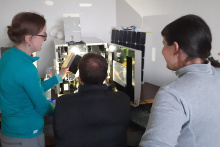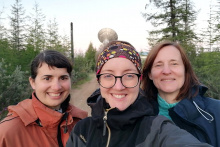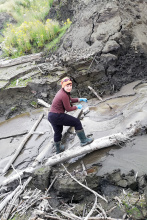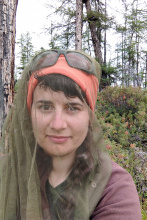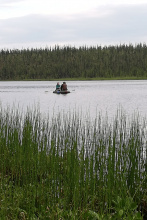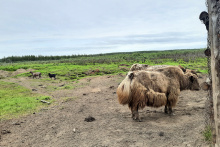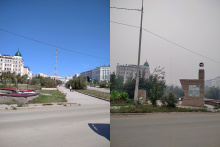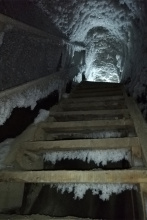Date added: 2021-08-30
Our scientists study the impact of climate change on the chemical composition of Siberian steppe

PhD, Eng. Małgorzata Szopińska from the Faculty of Civil and Environmental Engineering, Gdańsk Tech and PhD. Krystyna Kozioł from the Faculty of Chemistry, Gdańsk Tech, as part of the interuniversity research team CheMikroPolarLAB, conducted research in the Russian Arctic (Cherski). Near the place of research there is the so-called Pleistocene Park, where Russian scientists have been working since 1988 to restore grassland ecosystems by grazing large herbivores, which is to help protect climate-sensitive perennial permafrost and may contribute to reducing methane emissions to the atmosphere.
Research carried out in the Russian Arctic, with the participation of scientists from Gdańsk Tech, under the supervision of PhD, DSc Danuta Szumińska, professor at the university, from the Kazimierz Wielki University in Bydgoszcz, comprises the analysis of the release of various classes of pollutants, in particular persistent organic pollutants, from melting permafrost and determines the impact of climate change on their presence in rivers and lakes.
- We took samples of river and lake water supplied by water from melting permafrost and permafrost ice to decide whether the pollutants determined by us can be released from it to a significant extent - says PhD Małgorzata Szopińska. - If this hypothesis is confirmed, the project has a chance to continue in a wider spatial and temporal scope.
The CheMikroPolarLAB research group plans to perform an analysis for the presence of compounds from the group of polycyclic aromatic hydrocarbons derived from the combustion of various organic substances, including fossil fuels and biomass, as well as from forest fires.
– Some of them are carcinogenic, all of them are very persistent and harmful to ecosystems already exposed to various stress factors - explains PhD Krystyna Kozioł. - The first results are expected to be available in a few months, but action needs to be taken today to reduce fossil fuel combustion and greenhouse gas emissions as soon as possible, as fires and potential emissions from melting permafrost are just some of the many effects of climate change.
The importance of research for the entire globe
The researchers emphasize that even distant areas of the Earth are strongly interconnected and Arctic research is important for the entire globe.
– The Kolyma region is drained by one of the great Siberian rivers, which discharges its waters into the Arctic Ocean, so the pollutants potentially detected by us may affect a large area - says PhD Krystyna Kozioł. - Moreover, thawing of perennial permafrost is one of the more pronounced effects of human-induced climate change. It will get worse and can lead to numerous negative environmental effects. The subject of our research is one of such effects, i.e. the release of chemical pollutants with a long presence in the environment. They can affect the fragile ecosystem of the Arctic, which is an important issue in times of biodiversity crisis.
Gdańsk Tech researchers add that there are still gaps in knowledge about the cascading effects of climate change on ecosystems.
– Detecting additional effects of climate change in the form of pollutant release will allow us to correctly assess the threat - says PhD Małgorzata Szopińska. - Unfortunately, the news on climate change is generally very serious and the latest report by the Intergovernmental Panel on Climate Change (IPCC) talks about a virtually guaranteed 1.5 ° C warming in the short term, with the most likely scenario being around 3 ° C warming to the end of the century. And the effect is very dependent on the action that humanity takes collectively to reduce greenhouse gas emissions, and it is worth fighting for every fraction of a degree less. The awareness of the far-reaching and diverse effects of climate change helps to deal with them, accept the difficult truth and take appropriate action to reduce their negative aspects.
The CheMikroPolarLAB Group was established to conduct comprehensive chemical and microbiological research of the polar regions of the Arctic and Antarctic, and it operates under the supervision of Prof. Żaneta Polkowska from the Faculty of Chemistry at Gdańsk Tech. The PollAct project was funded by the International Arctic Terrestrial Research and Monitoring Network (INTERACT) as part of the International Infrastructure Sharing Program and is also part of the activities of this interdisciplinary research group.
Researcher’s work in Siberian conditions
PhD Krystyna Kozioł:
Before we left, we were warned that the temperature at the test site was above 30 degrees Celsius. It is true that Siberian summers can be warm, after all, it is a continental climate, but 32 degrees in Kolyma this summer is an exaggeration! In the whole region (Yakutia), even +48 degrees were recorded. Although I had read articles about fires in Siberia before, in Yakutsk I was surprised by the smoky sky and canceled flights. Live natural disasters make a really electrifying impression.
PhD, Eng. Małgorzata Szopińska:
During my stay in Siberia, I was most encouraged by the attitude of the Russians, their openness, family atmosphere and the care they surrounded us with. Thanks to their help, despite the difficulties related to restrictions due to COVID-19, it was possible to organize all the necessary documents and book proven airline destinations, so that the journey could run most efficiently. It was a fascinating experience to see with my own eyes the Pleistocene Park, which is a huge scientific undertaking.


